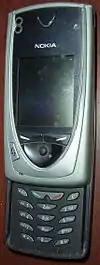 | |
| Manufacturer | Nokia |
|---|---|
| Compatible networks | GSM 900/1800 MHz[1] |
| Availability by region | June 2002[1] |
| Predecessor | Nokia 7110 |
| Successor | Nokia 3650 Nokia 6600 Nokia N80 |
| Form factor | Slider |
| Dimensions | 114 mm × 56 mm × 26 mm[1] |
| Mass | 154 g[1] |
| Operating system | Symbian OS 6.1, S60 1st Edition |
| Memory | 4 MB, 3.4 MB available to user[1] |
| Battery | BLB-2, 750mAh[2] Li-ion |
| Display | 176 x 208 pixel 4096 colours[1] |
| Rear camera | 0.3 Megapixels[1] 640x480 VGA |
| Connectivity | IrDA Bluetooth[1] |
The Nokia 7650 is a 2.5G consumer-oriented smartphone belonging to the fashion and experimental (7xxx) series. It was introduced in Barcelona on 19 November 2001,[3] and was described by CEO Jorma Ollila as the company's most important launch of that year.[4]
Feature-rich, it was the first Nokia phone with a built-in camera (VGA resolution), and thus its imaging capabilities was widely marketed. It has a large (at the time) 2.1" colour display with a resolution of 176x208 pixels. The 7650 was also the company's first to feature Multimedia Messaging Service (MMS), and it also has Bluetooth and GPRS connectivities[5] (although to much criticism did not support Bluetooth headsets).[6] It was also the first Nokia phone with sliding keypad, the second being the Series 40-based Nokia 6111, released in 2005.
In addition it was the first Series 60 platform device (which would go on to power the majority of Nokia smartphones for many years after), as well as the first mass market Symbian OS device to be released,[7] allowing the sideloading of both Java and EPOC applications. These factors made the 7650 much-hyped at the time, especially as it came almost four years after the formation of Symbian Ltd.[8] It was eventually released on 26 June 2002 for around €600. Good sales of the 7650 helped Symbian OS to become the top product in the European "handheld devices market" in Q3 2002, above Palm OS and Windows CE.[9] By this time its successor Nokia 3650 was introduced.
The handset's release was promoted in conjunction with the science fiction film Minority Report.[10]
The 7650's significance for its time has been hailed in later years, with many considering it as being one of the most important mobile devices and one of Nokia's most iconic products.[11][12][13]
Technical specifications
The Nokia 7650 has a 32-bit RISC CPU, based on ARM-9 series, a 104 MHz CPU clock, 4 MB of non-expandable main memory (RAM) (3.6 MB available to the user) and 16 MB ROM.
 Picture taken with a Nokia 7650 |
Other features
References
- 1 2 3 4 5 6 7 8 Mobiledia. "Nokia 7650 Phone". Archived from the original on 21 July 2012. Retrieved 26 September 2019.
- ↑ Mobiledia. "Nokia 3600 Phone". Archived from the original on 8 December 2012. Retrieved 30 August 2007.
- ↑ "Nokia's first imaging phone marks start of Multimedia Messaging era". Nokia (Press release). 19 November 2001. Archived from the original on 24 September 2016. Retrieved 26 September 2019.
- ↑ Orlowski, Andrew (20 November 2001). "Nokia 7650: smart phone, shame about the price". The Register. Retrieved 26 September 2019.
- ↑ Schäfer, Volker (20 November 2001). "Nokia: Handy mit eingebauter Kamera". www.teltarif.de.
- ↑ Choong, Aloysius (6 January 2003). "Nokia 7650 Review". ZDNet. Retrieved 26 September 2019.
- ↑ "Symbian's Secret History: The battle for the company's soul". www.theregister.co.uk.
- ↑ "Nokia 7650 – the camera phone future?". www.theregister.co.uk.
- ↑ Broersma, Matthew. "Microsoft launches smartphone assault". ZDNet.
- ↑ "Hello Neo: Nokia Exists Only In Movie Form (Mostly)". October 23, 2014.
- ↑ K, Peter (22 July 2015). "Nokia's forgotten smartphones". Phone Arena.
- ↑ "The incredible history of Nokia camera phones in pictures". Microsoft Devices Blog. July 25, 2013.
- ↑ "Retrospective: Nokia 7650". fonehouse blog. January 2013. Archived from the original on 2 March 2013. Retrieved 26 September 2019.